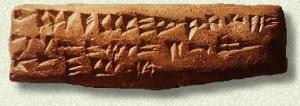The Museum of the Bible has never successfully steered itself away from controversy.Just a couple weeks back a story on NPR reported that federal authorities have determined that one of the MOB’s tablets of the Epic of Gilgamesh is a stolen artifact and it must go back to Iraq.While I don’t question the decision, I was a bit surprised that the Feds knew or cared anything about cuneiform documents.My academic specialization was Ugaritic, which is a language that was written in cuneiform.I quickly learned after my doctorate that no jobs exist for Ugaritologists, so you have to style yourself as a biblical scholar.The Museum of the Bible seems quite aware of the connection, but don’t go there looking for tablets.They belong elsewhere.
There is a public fascination with cuneiform, it seems.That doesn’t translate into jobs for those who know how to read wedge-writing since universities have become places of business.Their product—what they sell—is called “education” but in reality it is accreditation.Anyone who’s really driven can get a fairly decent bit of knowledge from the internet, if it’s used wisely.The most reputable sources are behind pay walls of course.What kind of civilization would give away knowledge for free?Anything can be commodified, even the knack for reading dead languages.One of the perks you pick up by studying this stuff officially is that artifacts really belong where they were found.Unprovenanced pieces are now routinely ignored by specialists because they’re so easily faked.That doesn’t stop those who can afford to from buying them.Right, Mr. Green?You’ve got to beware of the seller, though.
A few years back many of us watched with horror as extremists destroyed ancient artifacts kept in Syria’s museums.These were objects we’d spent years of our lives studying, and which cannot be replaced.They were “at home” where they belonged, but where some, at least, clearly didn’t appreciate them.Those of us who’ve studied ancient history recognized such behavior, I’m afraid.We’d read about it in documents as ancient as the artifacts being sledgehammered right there on the internet.Or you can buy such documents illegally sold and put them in a museum dedicated to a book that says somewhere that “thou shalt not bear false witness.”Such are the ironies of history.But then, as its provenance shows, that sentiment is apparently a museum piece as well.

Photo credit: Chaos, via Wikimedia Commons
